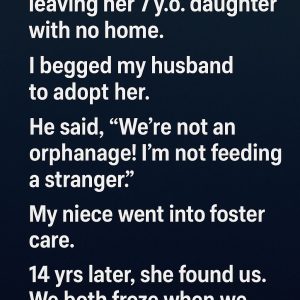I only meant to stop by the hospital for a few minutes — to collect my late mother’s medical paperwork and leave quietly. But as I walked past the oncology ward, I saw a sight that stopped me cold. A young boy, no older than eight, sat on the floor clutching a worn backpack, his eyes red from crying. People hurried past, unaware. Something in me couldn’t walk away. I knelt beside him and asked softly, “Hey there, are you okay?” He looked up and whispered, “My mom’s inside. She told me to wait, but she’s been gone a long time. I don’t want her to be sick anymore.” In that moment, I saw my own grief reflected in his.
His name was Malik. Between quiet sobs, he told me that he and his mother had been facing her illness alone for months. He tried to help by selling his toys, slipping the money into her purse when she wasn’t looking. Listening to him was like hearing my younger self — I had lost my mom in that same hallway only weeks before. When his mother, Mara, came out — pale but smiling faintly — I introduced myself. She explained that children weren’t allowed in consultations, so Malik waited alone each time. I understood all too well. Before leaving, I promised I’d visit them the next day.
The following morning, I arrived at their small apartment with muffins and chocolate croissants. The home was tidy but bare — just a couch, a TV, and two chairs. Over coffee, Mara shared her story: her treatments were costly, her insurance had lapsed, and she’d been skipping appointments to stretch what little money she had. Malik was doing odd jobs to help. My heart broke. I couldn’t bring my mother back, but I could honor her memory. I told Mara I would cover her medical expenses — every visit, every test. She protested, saying she could never repay me. I told her she already had — by giving me a reason to heal through kindness.





